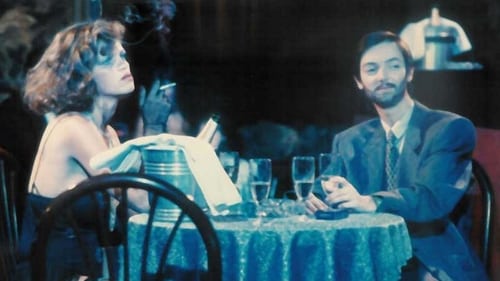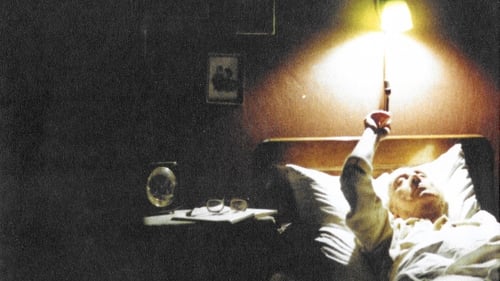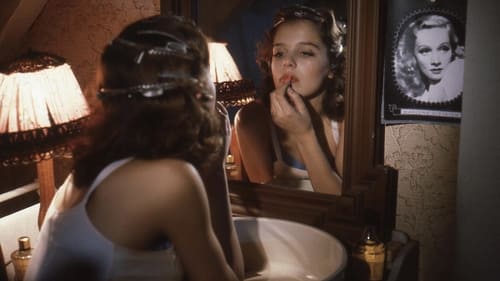
In this evocative work, we hear and see the interactions of a man and a woman in a pristine forest. We gain a sense of intimacy with them and nature. Suddenly we leave the worries of our scattered lives and begin to remember the primal elements of existence: earth, wind, fire, water, people, and creation. This epiphanic process demands patience and an almost meditative state, but it is so worth the effort – just as a journey a mountain meadow requires some effort in order to find its treasures. We leave the traditions of narrative for a more open approach to cinema. There are suggestions and onsets of a storyline, but almost everything remains a mystery for our encountering. This is a film that will allow you to observe and exist, without anxiety, without demands, and it allows you a rare glimpse into the life of things.

Paula
Lily, a stunning photograph model, suddenly notices that hair is growing on her face and escalating to a real "man's beard". Her lover, Richard, who has just returned from a prolonged business trip cannot help her. On the contrary, she is so exasperated that she runs away into the night of the big city where she has her first experiences as a "man".

Tina's mother
Vienna in the early eighties: After a suicide attempt, Tina, who comes from a middle-class family, is hospitalized in a psychiatric ward. There she gets to know Gerhard, an apprentice plumber, who also wanted to do away with himself. He comes from a working class family. They fall for each other.
A modern love story which is set inside the real life circumstances of the closing of the alternative Youth Center "Gassergasse" in Vienna.

Judit is up to her neck in art studies and the elitist art community but chucks it all to pursue a successful career as a billiard professional -- not exactly a likely alternative in real life, but certainly more lucrative. Just as she is finally at the apex of her chosen second field, Judit encounters male jealously and/or aggression in the form of intentional snubs from this different class of snobs, or in the worse instances, rape. Director Kitty Kino portrays many of the male figures in this film as weak, or drunk, or simply offensive, and because of the emphasis on those traits, the film will raise objections from some viewers. On the other hand, many women might see this film and feel that at least it brings up the difficulties women can face in getting ahead in a male-dominated arena, instead of side-stepping or ignoring the role of male prejudice.

The woman physician
An old man is to be evicted from his home. He is the last tenant in an old house. He refuses to leave the flat in which he has passed his whole life. All appeals asking him to be 'reasonable' are of no use. And when he finally gets out his shotgun, the cops appear and use tear gas to drive him out of his flat. He is put into a straitjacket and carried out of the house as someone who's 'aggressive and always grousing'. 'The film is a bitter elegy for the unknown Vienna, seen with the eyes of an old man. A remarkable Austrian film.'

Betty Ralf
The Political drama shows the denunciation and persecution of the 19-year-old Sanne in the Nazi state. After she falls in love with her cousin, Sanne is betrayed by her jealous aunt to the Gestapo.

Gertrud
Menschenfrauen is a film about relationships and the psychological oppression of women in society. Franz, a journalist, maintains relationships with four women. His three mistresses are introduced with television dreams of intense emotional violence (in the first dream, a mother shouts at her daughter, explaining that as a girl, she does not deserve a room of her own), and the fourth is his wife. He is desperate to have each to himself. Franz never offers a substantial sign of love, but is willing to say anything and make any promise for affection. His dependence on women for fulfilment is explained through arguments with his wife. He claims "I am my own sound. The women produce voices within me." An understandable and sometimes sympathetic antagonist is one of the films greatest strengths. The emotional damage he causes becomes believable.

Leiterin des Erziehungsheims
An author searches for cues about the life of a girl confined in a community home before her suicide. While trying to put together a literary piece he increasingly becomes aware of the insignificance of his own creative work. He has no insight in any world but his own.

After a frank confession by his wife, a doctor is called to see a dying patient. The cause of the night brings him to meet an old friend, a pianist, who tells him of a mysterious ball where he is due to perform. Based on the book "Traumnovelle" ("Rhapsody: A Dream Novel") by Arthur Schnitzler.







